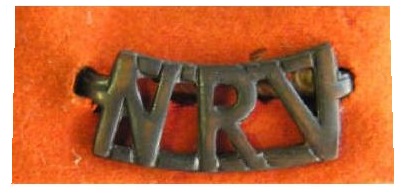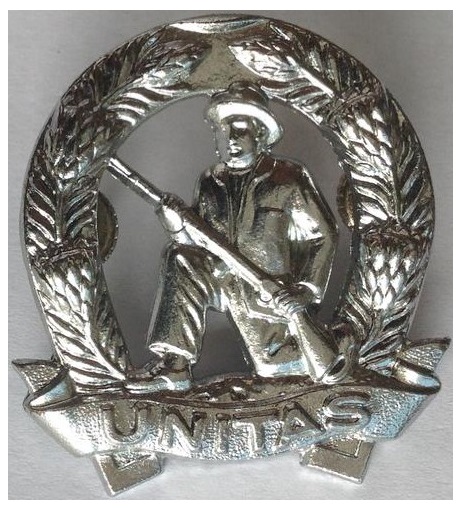|
Senekal Commando
Senekal Commando was a light infantry regiment of the South African Army. It formed part of the South African Army Infantry Formation as well as the South African Territorial Reserve. History Origin This unit started as a subunit of the Winburg Commando around 1900. Operations With the Orange Free State Republic After the battle of Paardekraal, the Senekal Commando joined up with General de Wet. On 4 April 1900, they defeated a British column near Mostertshoek. This was followed by a siege of Brabant`s Horse at Jammersberg. The last major battle was at Biddulphsberg on 29 May 1900 when this commando took positions in the mountains between Senekal to Ficksburg. With the UDF By 1902 all Commando remnants were under British military control and disarmed. By 1912, however previous Commando members could join shooting associations. By 1940, such commandos were under control of the National Reserve of Volunteers. These commandos were formally reactivated by 1948. Under the ... [...More Info...] [...Related Items...] OR: [Wikipedia] [Google] [Baidu] |
Orange Free State Republic
The Orange Free State ( nl, Oranje Vrijstaat; af, Oranje-Vrystaat;) was an independent Boer sovereign republic under British suzerainty in Southern Africa during the second half of the 19th century, which ceased to exist after it was defeated and surrendered to the British Empire at the end of the Second Boer War in 1902. It is one of the three historical precursors to the present-day Free State province. Extending between the Orange and Vaal rivers, its borders were determined by the United Kingdom of Great Britain and Ireland in 1848 when the region was proclaimed as the Orange River Sovereignty, with a British Resident based in Bloemfontein. Bloemfontein and the southern parts of the Sovereignty had previously been settled by Griqua and by ''Trekboere'' from the Cape Colony. The ''Voortrekker'' Republic of Natalia, founded in 1837, administered the northern part of the territory through a ''landdrost'' based at Winburg. This northern area was later in federation with t ... [...More Info...] [...Related Items...] OR: [Wikipedia] [Google] [Baidu] |
Infantry Regiments Of South Africa
Infantry is a military specialization which engages in ground combat on foot. Infantry generally consists of light infantry, mountain infantry, motorized infantry & mechanized infantry, airborne infantry, air assault infantry, and marine infantry. Although disused in modern times, heavy infantry also commonly made up the bulk of many historic armies. Infantry, cavalry, and artillery have traditionally made up the core of the combat arms professions of various armies, with the infantry almost always comprising the largest portion of these forces. Etymology and terminology In English, use of the term ''infantry'' began about the 1570s, describing soldiers who march and fight on foot. The word derives from Middle French ''infanterie'', from older Italian (also Spanish) ''infanteria'' (foot soldiers too inexperienced for cavalry), from Latin '' īnfāns'' (without speech, newborn, foolish), from which English also gets ''infant''. The individual-soldier term ''infa ... [...More Info...] [...Related Items...] OR: [Wikipedia] [Google] [Baidu] |
Charles Nqakula
Charles Nqakula (born 13 September 1942) is a South African politician who served as Minister of Defence from September 2008 to 2009. He also served as Minister for Safety and Security from May 2002 to September 2008. Nqakula is married to former South African Minister of Defence and Military Veterans, Nosiviwe Mapisa-Nqakula MP. On 24 June 2012, South African President Jacob Zuma appointed Nqakula as High Commissioner to the Republic of Mozambique. Early life Charles Nqakula attended primary school in Cradock and secondary school in Lovedale, matriculating in 1963. He worked as a hotel waiter and wine steward, after which he became a clerk in the Department of Bantu Education. Journalism In 1966, Nqakula started as a journalist with the ''Midland News'', a regional weekly newspaper in Cradock. Seven years later, he became a political reporter with ''Imvo Zabantsundu'' in King William's Town. From 1976 he worked for the Daily Dispatch in East London until he was placed ... [...More Info...] [...Related Items...] OR: [Wikipedia] [Google] [Baidu] |
Minister Of Police (South Africa)
The Minister of Police (formerly known as the Minister for Safety and Security) is a minister in the Government of South Africa with political responsibility for the Department of Police, including the South African Police Service, the Independent Police Investigative Directorate, the Private Security industry Regulatory Authority, and the Civilian Secretariat for Police. The current Minister of police is General Bheki Cele. References External links South African Police ServiceIndependent Police Investigative DirectorateCivilian Secretariat for PolicePrivate Security Industry Regulatory Authority {{SouthAfrica-gov-stub Police The police are a constituted body of persons empowered by a state, with the aim to enforce the law, to ensure the safety, health and possessions of citizens, and to prevent crime and civil disorder. Their lawful powers include arrest a ... Law enforcement in South Africa ... [...More Info...] [...Related Items...] OR: [Wikipedia] [Google] [Baidu] |
Thabo Mbeki
Thabo Mvuyelwa Mbeki KStJ (; born 18 June 1942) is a South African politician who was the second president of South Africa from 14 June 1999 to 24 September 2008, when he resigned at the request of his party, the African National Congress (ANC). Before that, he was deputy president under Nelson Mandela between 1994 and 1999. The son of Govan Mbeki, a renowned ANC intellectual, Mbeki has been involved in ANC politics since 1956, when he joined the ANC Youth League, and has been a member of the party's National Executive Committee since 1975. Born in the Transkei, he left South Africa aged twenty to attend university in England, and spent almost three decades in exile abroad, until the ANC was unbanned in 1990. He rose through the organisation in its information and publicity section and as Oliver Tambo's protégé, but he was also an experienced diplomat, serving as the ANC's official representative in several of its African outposts. He was an early advocate for and leader ... [...More Info...] [...Related Items...] OR: [Wikipedia] [Google] [Baidu] |
South African Commando System
The Commando System was a mostly voluntary, part-time force of the South African Army, but in their role as local militia the units were often deployed in support of and under the authority of the South African Police. Mission South Africa's Commando System was responsible for the safeguarding and protection of specific communities (usually rural, but sometimes urban). Commando units were usually referred to as area protection, a system which involved the whole community. The participants in the Commando System did not have military commitments outside of the areas they served and were responsible for the safety and security of their own communities. History Origin The Commando system existed from the 1770s. The early Boer Commando system was a conscriptive service designed to provide a quickly-trained fighting force. Commandos were a product of the First Boer War during which the fiercely independent Boers had no regular army. When danger threatened, all the men in a distr ... [...More Info...] [...Related Items...] OR: [Wikipedia] [Google] [Baidu] |
UDF Era National Reserve Of Volunteers Shoulder Tab
UDF may refer to: Astronomy * Ultra Deep Field, a view of the distant universe taken in 2004 by the Hubble space telescope ** UDF 423, a distant spiral galaxy ** UDF 2457, a red dwarf star Computing * Universal Disk Format, an operating-system-independent file system commonly used on DVD and other digital media * Uniqueness Database File, a Windows XP Professional configuration text file * User-defined function, a function provided by the user of a program or environment Organizations Politics * United Democratic Forces (ОДС), an electoral alliance in Bulgaria * United Democratic Forces of Belarus, a coalition of political parties participating as the main opposition group during the 2006 presidential election * United Democratic Front (Botswana) * United Democratic Front (Kerala), India * United Democratic Front (Mizoram), India * United Democratic Front (Malawi) * United Democratic Front (Namibia) * United Democratic Front (Pakistan) * United Democratic Front (South Africa ... [...More Info...] [...Related Items...] OR: [Wikipedia] [Google] [Baidu] |
Ficksburg
Ficksburg is a town situated at the foot of the 1,750 meter high Imperani Mountain in Free State province, South Africa. The town was founded by General Johan Fick in 1867 who won the territory in the Basotho Wars. He laid out many erven and plots that could be bought at a reasonable price. The town was later proclaimed a municipality in 1891. The last Governor-General of the Union of South Africa and the first State President of South Africa, Charles Robberts Swart was imprisoned here by the British in 1914 and released one day before his scheduled execution. Profile Ficksburg, after Bethlehem (the chief administrative town) is the second busiest and important town in the Eastern Free State region of the Free State province. It is an important agricultural region where crops like corn and mealies (maize) and asparagus are grown. The most important part of the annual crop of Ficksburg is the harvesting of the cherries on the numerous cherry farms surrounding the town. The ch ... [...More Info...] [...Related Items...] OR: [Wikipedia] [Google] [Baidu] |
Infantry
Infantry is a military specialization which engages in ground combat on foot. Infantry generally consists of light infantry, mountain infantry, motorized infantry & mechanized infantry, airborne infantry, air assault infantry, and marine infantry. Although disused in modern times, heavy infantry also commonly made up the bulk of many historic armies. Infantry, cavalry, and artillery have traditionally made up the core of the combat arms professions of various armies, with the infantry almost always comprising the largest portion of these forces. Etymology and terminology In English, use of the term ''infantry'' began about the 1570s, describing soldiers who march and fight on foot. The word derives from Middle French ''infanterie'', from older Italian (also Spanish) ''infanteria'' (foot soldiers too inexperienced for cavalry), from Latin '' īnfāns'' (without speech, newborn, foolish), from which English also gets ''infant''. The individual-soldier te ... [...More Info...] [...Related Items...] OR: [Wikipedia] [Google] [Baidu] |






